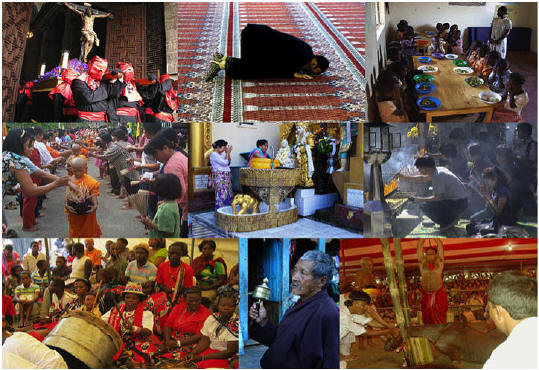Ralph Murphy
Religion is an enormously potent tool of social and geopolitical interaction whose power to influence on the world stage has historically proven constructive and destructive depending on how and to what purpose it is applied. The religions of primary interest in today's world vary widely in beliefs and practices, but do appear to have common
denominators or similar internal basis of conflict which can be delineated as those who believe one has free choice and is subsequently accountable for actions taken, and those who believe in predestination, or the concept that God has a plan for all creation, and one achieves salvation by accepting it as His will.

Current international conflicts, especially in the Middle East, often stem from a conflicting belief system or associated, cultural variance which even when taken for "good" or constructive ends- antagonize followers leading to civil strife, or outsiders leading to war. Many strategic conflicts offer an opportunity for national betterment, but when
taken in the name of a divine power afford a potency which goes beyond the dollars and cents of territorial or institutional gain. Few domestic or international efforts are taken in the name of wanton destruction, or Satan.
The best of intentions in the simplicity of theological revolution are often perverted by the realities of opportunist interactions. For example, a revolution not founded on sound underpinnings or not likely to survive a succession crisis. Flawless logic based on an inaccurate or unrealistic base premise is still going to lead to a wrong answer or
probably unintended results.
The primary players in the world's most prominent religion by numbers of adherents are Christianity, then Muslims, Hindus and Buddhists. Judaism is enormously influential in Western nations, but claims to have less than 20 million followers worldwide, with most residing in the United States and Israel.
Most Christian teachings harp on the theme of eternal salvation through adherence to the teachings of Jesus Christ. Simply put, if you don't accept them you can't go to Heaven. This implies choice- generally considered free will. French theologian John Calvin writing in the early 1500's took exception to the prevailing church view, and considered
salvation "a gift" and actions the result of God's will- not an ndividualís. This belief apparently was garnered from the Biblical book of Ephesians. He did a lot of running from the powerful Vatican, but did gain adherents in the British Isles, who brought their religious views to America while seeking religious freedom.
Muslims who routinely wage holy war or "jihad" based on religious values take a dichotomy on the justification for their actions with the Quran claiming "nothing will happen to us except what Allah has preordained and decreed for us. He is our protection." Not that far removed from Calvin. Muslim theologians, however, in an apparent expression of those
believing in free will- claim "man possesses free choice, the faculty to choose between right and wrong." We're back to square one!
Hindus are evidently the world's oldest, currently practiced religion- and also one of the most amorphous, with a decentralization of beliefs common in India and Nepal. Tracing back to the Iron Age, with over one billion adherents- it is the world's third largest religion in number of adherents. It espouses the belief in a "supreme being", and that the
soul is in a constant state of "being" whether residing in a body or in the after life. The "free choice" and reincarnation adherents appear to have risen to the forefront of this grouping in that Hindus believe people "reap the consequences of (their) actions in the next life." Same soul in a different body. The cycle of death and rebirth ends in "Moksha" or surrender to
God. That implying submission to God's will.
Buddhism with over 300 million adherents in the Indian subcontinent and Far East is also a major religion with enlightenment implying the realization that we are on earth to follow God's plan or "the middle way". Accepting that and not fighting God's will- guarantees salvation.
The Jewish faith took root in the Bronze Age over 3000 years ago and has mutated over the millennia, but is now divided roughly, into three divisions- Orthodox, Conservative, and Reform. The Orthodox Jews believe the Torah and Jewish Law is divine. Conservative and Reform Jews are progressively more liberal in their interpretation of the Torah and its
impact on daily life. They also question more openly Rabbinic tradition and the significance of the State of Israel.
As with the leadership of most other major religions, the Jews appear existential in their guiding principles- claiming the Creator "rewards those who keep his commandments and punishes those who transgress them." Judaism focuses mainly on reward and punishment "here and now" on earth. An after life or Olam Ha-Ba (the world to come) allows that a
reincarnation is desirable and achievable. Orthodox Jews believe wicked souls "cease to exist" upon death. The Torah claims the righteous "will be united with loved ones after death while the wicked are excluded from reunion." So itís not the concept of God testing one's submission to his plan as a basis for salvation- rather choice determining the transmigration of souls.
The differentiation and friction in religion (and by extension politics and economics) is associated with the social groupings that espouse free choice, and those who believe in predestination. This plays a key role in each nation's social fabric. Understanding what appears to be a justification for actions as "man's will" or "God's will" may allay an
important source of conflict, and lead to greater harmony among peoples.
Read other articles by Ralph Murphy